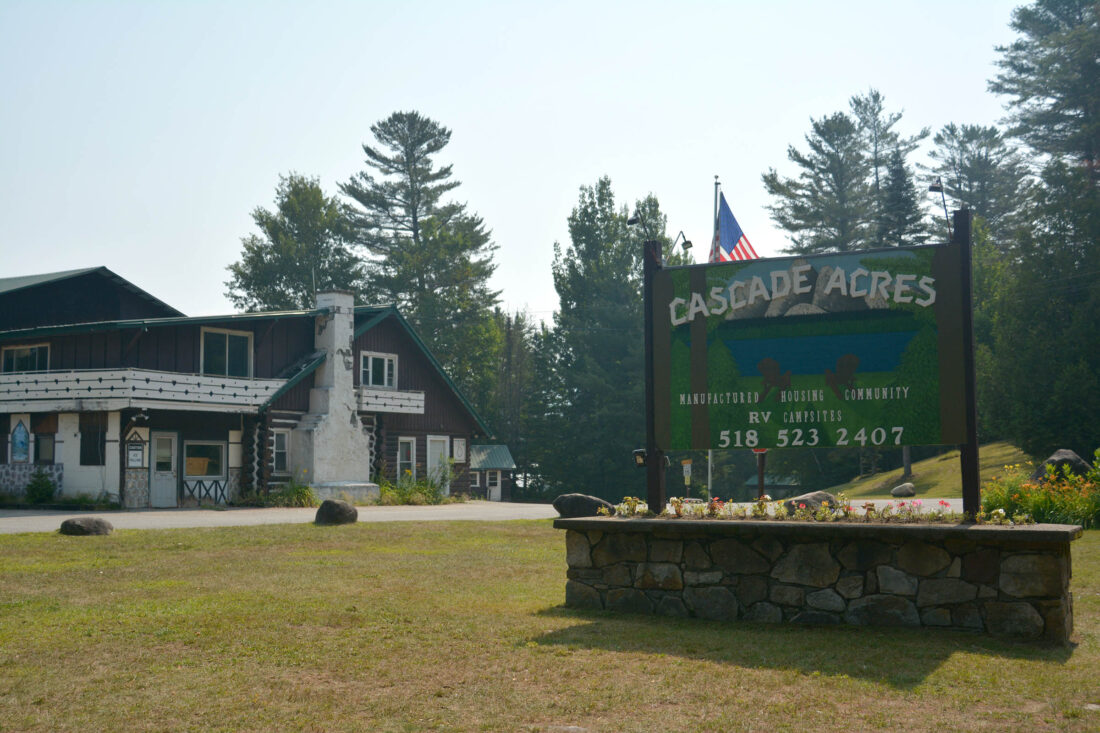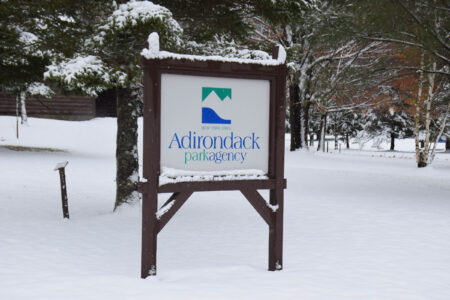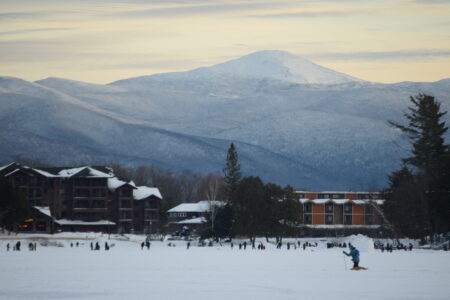Effort to resist sale of Cascade Acres appears successful
HOA signs contract to purchase mobile home park, transfer to local park manager instead of equity firm

Cascade Acres is seen here on Monday, Aug. 4. (Enterprise photo — Parker O’Brien)
LAKE PLACID — A last-minute attempt by the residents of the Cascade Acres mobile home park to stop the sale of the park to a private equity firm appears to be successful.
On Tuesday, Brandon Montag — the executor for the park’s new homeowners association — said all parties have signed the purchase agreement, with an anticipated sale closure in the fall. After the sale closes, the HOA plans to assign the purchase to Montag.
In the spring, current Cascade Acres owner M.H. Communities Ltd. announced its intentions to sell the 52-acre park to the private equity firm Crown Communities LLC. Residents moved fast, fearing they could lose their homes under new management.
They formed an HOA; exercised their right of first refusal on the sale; got a $5.4 million state loan to match the appraised property value; got an additional $420,000 loan from the village of Lake Placid to match the gap between the state loan and Crown’s offer; recruited Montag — who owns the Birch Park Community mobile home park in Lake Clear — to be the property manager and financier; and had lawyers debate the terms of the contract, with a lot of prayer in between, according to HOA co-founder Sarah Fitzgerald.
Crown is buying a number of M.H. Communities’ parks around the northeast in a package deal totaling $87.5 million.
Cascade Acres residents were nervous. They didn’t like what they were hearing about Crown’s record with other parks.
A rumor had sprung up that Crown planned to replace the 124 manufactured homes with condos. This was not substantiated, though, and owners of the company said they had no such plans. The contract would have required them to keep the land as a modular home park for five years. HOA co-founder Ryan Preston said the park might have been fine under Crown, but they didn’t want to risk it.
The park’s potential sale drew the attention of people from around the area who were concerned about its future. Montag, Fitzgerald and Preston said, everywhere they go, people ask them about how it is going. The park is a key part of the Lake Placid community and economy, Fitzgerald said. She said there are few options for people to find affordable housing in Lake Placid — or surrounding areas, for that matter.
Preston estimates the Cascade Acres neighborhood is home to around 200 employees, 30 seniors and veterans and 5% to 7% of the school district’s students. If rents go up, if quality of life goes down or if the property were eventually turned into condos, he said they would not have anywhere to go. If they lose that community, the Lake Placid community would suffer, he said.
–
The contract
–
The sale is not finalized, but they’re breathing easier.
“We can’t really, really breathe until that final ‘t’ is crossed and ‘i’ is dotted,” Fitzgerald said, “but we’re in the right direction.”
They want to keep affordable housing affordable, giving the park the best chance for the future and are excited to have a local owner.
Preston hopes not much will change after the sale closes. His wish is for the residents to continue their lives as normal.
The state’s loan is a 20-year loan and the village’s is a 15-year loan.
Montag is putting down the money himself. He does not believe in using grant money for these ventures. As a “for-profit person,” he prefers loans.
The HOA could buy him out in the future, if they choose to do so, and Montag said he’d be happy to work with them on that.
Montag said the state has been very helpful.
“Thank God for the state stepping up and doing what they’re doing,” he said. “Having their guidance has just been instrumental.”
Preston said this is one of the first times — if not the first time — a New York modular home park community has exercised its right of first refusal since the state expanded that right with a law in 2023.
“This will be a good test case, I think, for the state to see how the new law works,” Montag said. “Hopefully it’s a win-win for everybody.”
Things looked bleak before, but are heading in “a positive direction,” Montag feels.
Preston said M.H. Communities was apprehensive of the sale to the HOA at first. They did not immediately accept the HOA’s purchase offer. Preston said the company wanted to make sure they got paid. Once they realized the HOA was legit, they worked with them.
The lawyers talked back and forth for a while — it was lot of “legalese,” Montag said.
He agreed to some concessions on the contract.
“Anyone who hasn’t paid their rent (to M.H. Communities), we have to pay their rent for them, essentially, to make the seller whole,” Montag said.
First thing, he said he’ll need to figure out why people are not paying rent and tell them to get up-to-date on their payments or be evicted.
“I only have three rules,” Montag said. “Pay rent on time or communicate, live clean, no cops.”
State law says manufactured home park owners cannot raise lot rents more than 3% a year, unless they can prove they have valid and required operating expense increases — mostly related to tax increases or infrastructure improvements. The maximum cap is at 6%.
Montag said none of his expenses increase at a rate as low as 3%, so his goal is to bring in new residents to counteract the rising costs of operating the park.
He could charge more, but said he wants the people living there to be able to “get by.” And he wants to keep his good tenants.
The contract signage triggers 60 days of due diligence time and a 90-day deadline to close on the sale.
Montag will do a needs assessment. He said engineers will see how feasible it is to fix up the park with their budget and scope. They’ll inspect pads and septic and water lines.
Montag said he’ll interview the four park staff to see if they are a good fit to stay on at the park. He said M.H. Communities wanted this condition.
–
Infrastructure plans
–
Montag said they’ve got their work cut out for them and he plans to make big changes.
He wants to tap into village sewer lines to convert from a septic waste system. The sewer line runs right through the middle of the park.
“When you’ve got that many leach fields and septic tanks all next to each other, you’re just bound for problems,” Montag said.
Currently, he said there is only one water meter for the whole community.
“One of the biggest expenses for the community is water,” Montag said.
Some people use a normal amount of water. Others use more than their fair share, especially during the winter when some run water to keep water pipes from freezing instead of wrapping them in heat tape. This over-taxes the septic systems, too, Montag said. He said by individually metering water for each unit, he’ll be able to reduce lot rents for people who use an average amount of water.
Fitzgerald said Montag has great ideas, listens and seems to want to support the community. She said she’s brought a couple ideas to him. The only school bus stop is at the entrance to the neighborhood. Her children are lucky enough to sit in a car on days with sub-zero temperatures, but some kids stand out there for 10 to 15 minutes.
Fitzgerald also said she’d like to see the playground and basketball court brought back, and eventually the tennis court and pool.
–
New homes
–
Montag said there is more demand for affordable housing than ever in the Tri-Lakes.
“We need it bad,” he said.
Preston said Cascade Acres is one of the only properties with the ability to increase affordable housing in the village. Montag estimates there are 20 to 30 more lots that can be added.
When he bought Birch Park in 2022, it had 30 pads with the potential for 40 in the permit. Around a dozen were too far gone. He added 22 new homes in three years and now has 100% occupancy there, with a waiting list.
“That’s the goal,” Montag said, “to infill with new homes, clean up some of the old ones, help the good tenants who have not great homes, get them into better-quality places and in general increasing the stock of affordable housing.”
Montag buys the units at retail cost from the factory, so he can sell them at a lower price. His incentive is lot rent, not the sale of the home, he said.
He said he’ll need to get rid of some units because they are in bad shape. He also hopes to help people replace their units.
It has always been a challenge to get loans for manufactured homes, he said. They use chattel loans, the same type of loan as used for a car.
“Terrible terms, steep down payments, and the interest rates are through the roof,” Montag said.
The interest rates are more than 10% on average right now, he said. They are unaffordable, unattainable and have “crappy” terms.
But there are new state mortgage programs, he said that can get modular homeowners 30-year notes with 3% to 5% down payments.
He said these can make paying lot rent and a brand new home mortgage cheaper than paying off a “crappy” quality home in town. He said modular homes are better than they used to be by “leaps and bounds.”
Montag said modular homes are built at around $155 per square foot. Houses in Lake Placid usually cost several hundred dollars per square foot for builder-grade finishes, he said. The biggest expense for modular homes is shipping them from Pennsylvania.
Preston and Fitzgerald said the whole process has brought the Cascade Acres community together. They said they’ve met neighbors they never knew and feel closer now, with a shared hope for the future.



